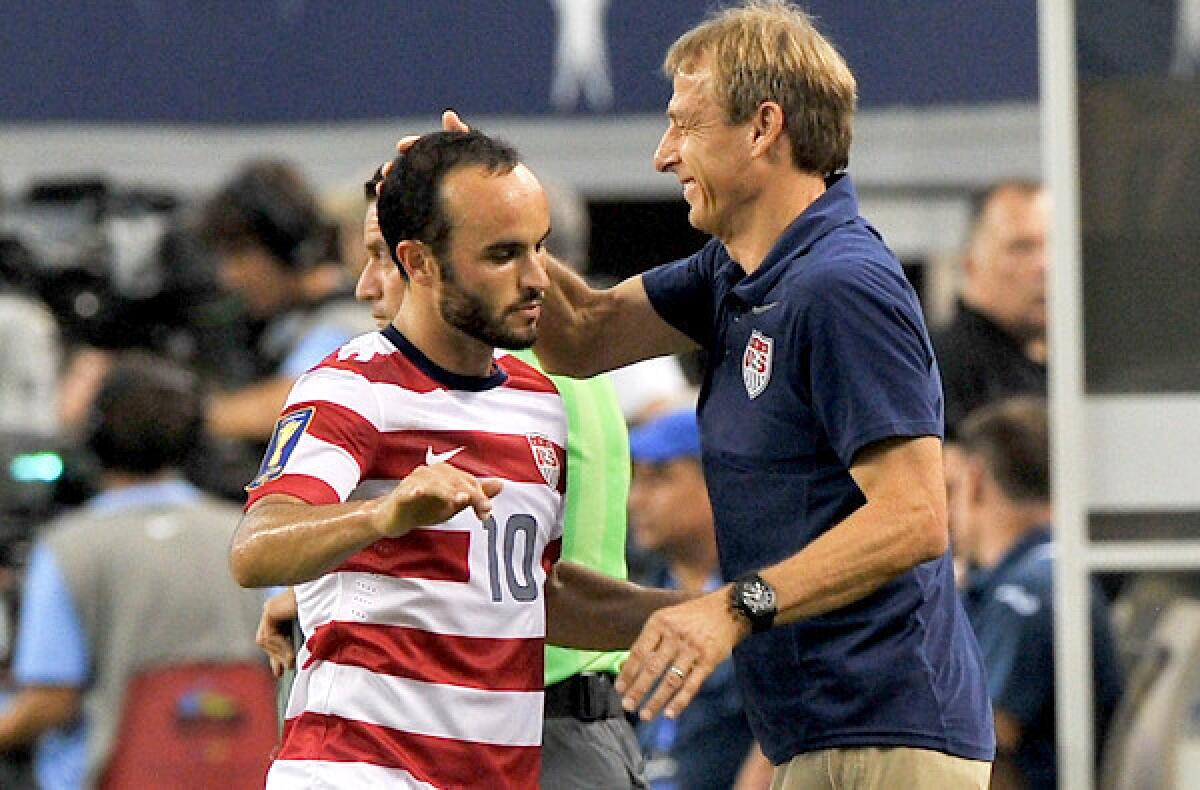U.S. soccer players work makes coach’s work ethic pay off

- Share via
Two days after qualifying for the World Cup this month U.S. soccer got more good news when FIFA, the sport’s global governing body, released its monthly rankings. The Americans had jumped six spots to No. 13 in the world, their best showing in more than three years.
All of which means … well, absolutely nothing.
Since the rankings debuted 21 years ago, no team listed No. 1 heading into a World Cup has gone on to win the tournament. In both 1998 and 2002, nine of the top 10 teams didn’t even reach the semifinals.
But the rankings do confirm what the naked eye has already told us: Juergen Klinsmann’s squad is on the verge of joining the conversation when the world’s best teams are debated. And it got there virtually overnight. Consider:
•Eighteen months ago, the U.S. couldn’t get out of group play in the Olympic qualifying tournament.
•A year ago the Americans were ranked 36th in the world, their lowest ranking ever.
•Seven months ago, Klinsmann’s team lost its opening match in the six-team round of World Cup qualifying for the first time
Now the U.S. is one of 10 countries already qualified for Brazil and it has a chance to jump into the top 10 in the world rankings for the first time in two World Cup cycles.
That, however, was the easy part. Having won one World Cup as a player and taken Germany to a third-place finish as a coach, Klinsmann knows the real work starts now, nine months before the tournament begins.
“The next step for us … is obviously making it clear to the players that the World Cup is another two levels up,” Klinsmann said last week. “It’s a moment that only comes around every four years and they have to prepare for it and work for it.”
Klinsmann has been preparing and working for it since the day he was hired 26 months ago. His goal then was to impress upon the players how far the U.S. had fallen behind the rest of the world in terms of training, conditioning, preparation and play — and then to show them how they could close the gap.
“You can play with them one day if you understand what it takes,” he said then.
For the coach, that started with accountability. Nobody was guaranteed a job, they had to earn it — which is why Klinsmann used 54 players in 14 matches in his first full year as coach. And national team members, especially those playing domestically in Major League Soccer, had to set an example by being the first on the practice field and the last to leave.
They had to eat right, sleep right and train more. In Klinsmann’s mind, soccer isn’t a 90-minute game but a 24/7 lifestyle. Players were asked to make a simple calculation before every move they made: Is this going to make me a better soccer player? If the answer was no, then don’t do it.
“It’s all about getting better as a team and trying to get on the same page with the coaches,” said forward Eddie Johnson, whom Klinsmann brought back to the national team after a two-year absence. “Camp after camp we’re trying to get better and establish that identity as a national team.”
Not everyone bought into Klinsmann’s methods, of course. As recently as March nearly a dozen players complained anonymously to Sporting News reporter Brian Straus that they were being “overtrained and undercoached.” There was too much emphasis on fitness and nutrition, they said, and on other off-field activities such as yoga and aptitude testing.
Klinsmann didn’t back down, though, and 10 weeks later his team started a streak that would see it win a U.S.-record 12 consecutive matches. The complaining stopped and the believing began.
“Step by step, we’re getting closer to taking the game to the opponents,” Klinsmann said. “Certain things that maybe two years ago, they may have wondered what all this was about — all this extra work, extra here, extra there — now it’s just normal. The players come in and they know there are double sessions waiting for them.
“The players know there’s another guy behind them in every position, that if he doesn’t give everything he has the next one comes in and steals his spot.”
As a result the U.S. leads the CONCACAF standings with two relatively meaningless October qualifiers remaining. It also has a November friendly with Scotland to play ahead of December’s World Cup draw, which will determine who, where and when the Americans will play in Brazil next summer. The last 26 months have simply been the first step on the road Klinsmann has laid out for U.S. soccer. Now the real work starts.
“We have to make it clear that everything is important going forward,” Klinsmann said. “It’s how they live their lives off the field in terms of sleep, food, regeneration and all those things.”
“The players,” the coach promises “aren’t getting any rest.”
kevin.baxter@latimes.com
Twitter: @kbaxter11
More to Read
Go beyond the scoreboard
Get the latest on L.A.'s teams in the daily Sports Report newsletter.
You may occasionally receive promotional content from the Los Angeles Times.







